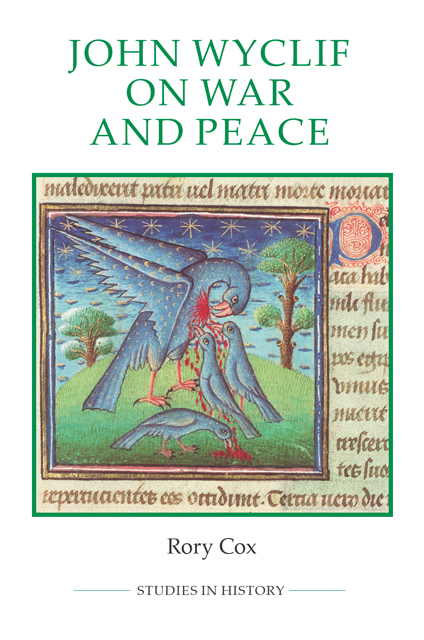Book contents
- Frontmatter
- Dedication
- Contents
- Acknowledgements
- Abbreviations
- A note on the chronology of Wyclif’s Latin works
- Introduction: War, peace and Wyclif
- 1 The development of just war doctrine up to the fourteenth century
- 2 Wyclif’s rejection of just cause
- 3 Wyclif’s rejection of proper authority
- 4 Wyclif’s rejection of correct intention
- 5 Wyclif on politics
- 6 The medieval pacifist
- Conclusion
- Bibliography
- Index
3 - Wyclif’s rejection of proper authority
Published online by Cambridge University Press: 24 February 2023
- Frontmatter
- Dedication
- Contents
- Acknowledgements
- Abbreviations
- A note on the chronology of Wyclif’s Latin works
- Introduction: War, peace and Wyclif
- 1 The development of just war doctrine up to the fourteenth century
- 2 Wyclif’s rejection of just cause
- 3 Wyclif’s rejection of proper authority
- 4 Wyclif’s rejection of correct intention
- 5 Wyclif on politics
- 6 The medieval pacifist
- Conclusion
- Bibliography
- Index
Summary
The condition of proper authority was perhaps the most vigorously debated of the three principal conditions of medieval just war doctrine. Roman law, the study of which had flourished since the eleventh century in centres such as Bologna and Ravenna, looked to the singular authority of the princeps (emperor) to wage just and lawful wars. But, by the fourteenth century, civilians such as Bartolus and Baldus were coming to grips with the reality that the de facto authority of the empire had passed, and that sufficient de facto sovereignty could be translated into the de iure authority to declare war. Within canon law, which had long been influenced by the jurisprudence of the Romanists, the question of authority had always remained ambiguous. References to the ‘public’ (publica) or ‘ordinary’ (ordinaria) authority necessary to declare war were open to interpretation by those wishing to support the authority of pope, emperor, king, duke, bishop or baron. Even after the use of the term princeps became common in canon law commentaries from the late twelfth century onwards, its medieval meaning was rarely restricted to the Roman concept of a singular authority embodied by the emperor. In addition, a militarised nobility assumed a legal right to make private war. The canonistic analysis of proper authority was motivated by a desire to curb this private war-making and to restrict the right to declare war to the Church, emperor and the increasingly centralised monarchies of western Europe. Nevertheless, while medieval canonists, Romanists, theologians and lay nobility were divided in their opinions as to who possessed the proper authority to declare and wage just wars, there was consensus that such authority did exist within the human sphere.
Wyclif was not swayed by this consensus. Influenced by his doctrine of grace-founded dominium and of the necessity of grace as a basis for just actions, he attacked the assumption that human agents could assume the authority to declare war. Based on a literal reading of biblical commands never to kill the innocent, which were further problematised by the hidden nature of grace (and thus innocence), Wyclif increasingly interpreted warfare not as justified killing but as mass homicide. In these reflections and doubts, the seeds of which can be detected in some of his earliest non-philosophical works, Wyclif undermined the second pillar of traditional just war doctrine.
- Type
- Chapter
- Information
- John Wyclif on War and Peace , pp. 73 - 87Publisher: Boydell & BrewerPrint publication year: 2014



